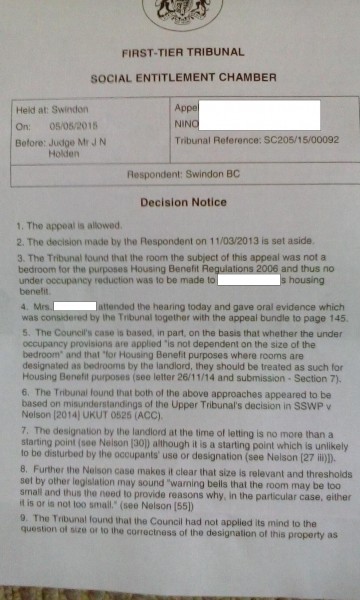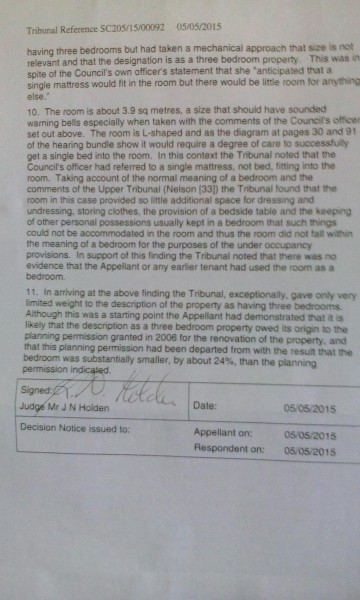A couple of bedroom tax decisions, one Upper Tribunal, one FTT, both of which involve findings for the tenant in the landscape after the Upper Tribunal decision in Nelson (SSWP v David Nelson and Fife Council, SSWP v James Nelson and Fife Council [2014] UKUT 0525 (AAC) – our report). Given that we appear to be stuck with the bedroom tax for the next 5 years at least, this is the landscape unless the Supreme Court does something dramatic in MA & Ors.
In the Upper Tribunal CSH/734/2014
This was the SS WP’s appeal of an FTT decision that a downstairs bedroom was no longer a bedroom. The DWP argued that the Nelson decision should be taken as meaning that it was not what use a tenant made of a room but whether the room could be used as a bedroom looking at the property as vacant. The FTT had erred in applying a ‘long established use’ test.
The tenant argued that the DWPa argument would mean that a room being classified as a bedroom by the landlord would be the be all and end all of the argument. Nelson properly read allows room for redesignation. The relevant facts in this case pointed to a medical reason for redesignation. While Nelson had only given examples of medically based redesignation which involves physical alterations, to restrict redesignation to physical alteration would be to discriminate between physical and mental health problems or learning disabilities and this would be unreasonable.
The UT found that para 27(iii) of Nelson meant that choice of room use by the tenant was not wholly excluded as ‘never relevant’ – which was effectively the DWP argument here. Further para 29 did envisage issues of designation of a room could arise.
In this case, the tenant was a single woman with severe learning disability and autistic traits. She could not live by herself. The other occupants of the house, Mr & Mrs X, used the original living room as their living room and the downstairs bedroom was a living room for the tenant, which she needed for privacy (and that of mr & Mrs X) because she got unsettled and agitated and needed space to watch her own programmes on television and listen to music. Her twice weekly carers would spend time in room with her. This use of the room had been the resulting of planning by social workers when arrangements for Mr & Mrs X to move in to look after the tenant were made.
The UT concluded that the Nelson “left open the question of whether or not there might be exceptional circumstances where redesignation might be appropriate”. There was no reason why redesignation on professional advice for a mental health or mental disability condition could not be one of those circumstances that a tribunal can take into account in determining whether a room was available for use as a bedroom. it was not limited to circumstances of physical adaptation.
Appeal refused. The FTT was entitled to find it credible and reasonable that the tenant required her own living space because of her disability.
Then in the FTT, an appeal from Swindon, 5 May 2015 – SC205/15/00092
The decision is in the images below in full (Click for larger. Thanks to @speyejoe). In short, the council argued that the HB regs applied regardless of size of room and designation by the landlord as bedroom was sufficient.
Unsurprisingly, given what we noted in Nelson, this did not go well when the room at issue was an L shaped 3.9 square metres and could barely fit a single mattress, let alone a bed frame or space for dressing, undressing, storing clothes or other things that would normally be kept in a bedroom, that it could not be so classed (ref para 33 of Nelson). Limited weight was given to the landlord’s description, exceptionally, not least as this appeared to have been based on a planning permission which had been departed from in the actual building.


Hi Giles. Is it at all possible to put the Swindon SC205/15/00092 FTT. In a separate post please??
To make it easier to download
Regards Debbie